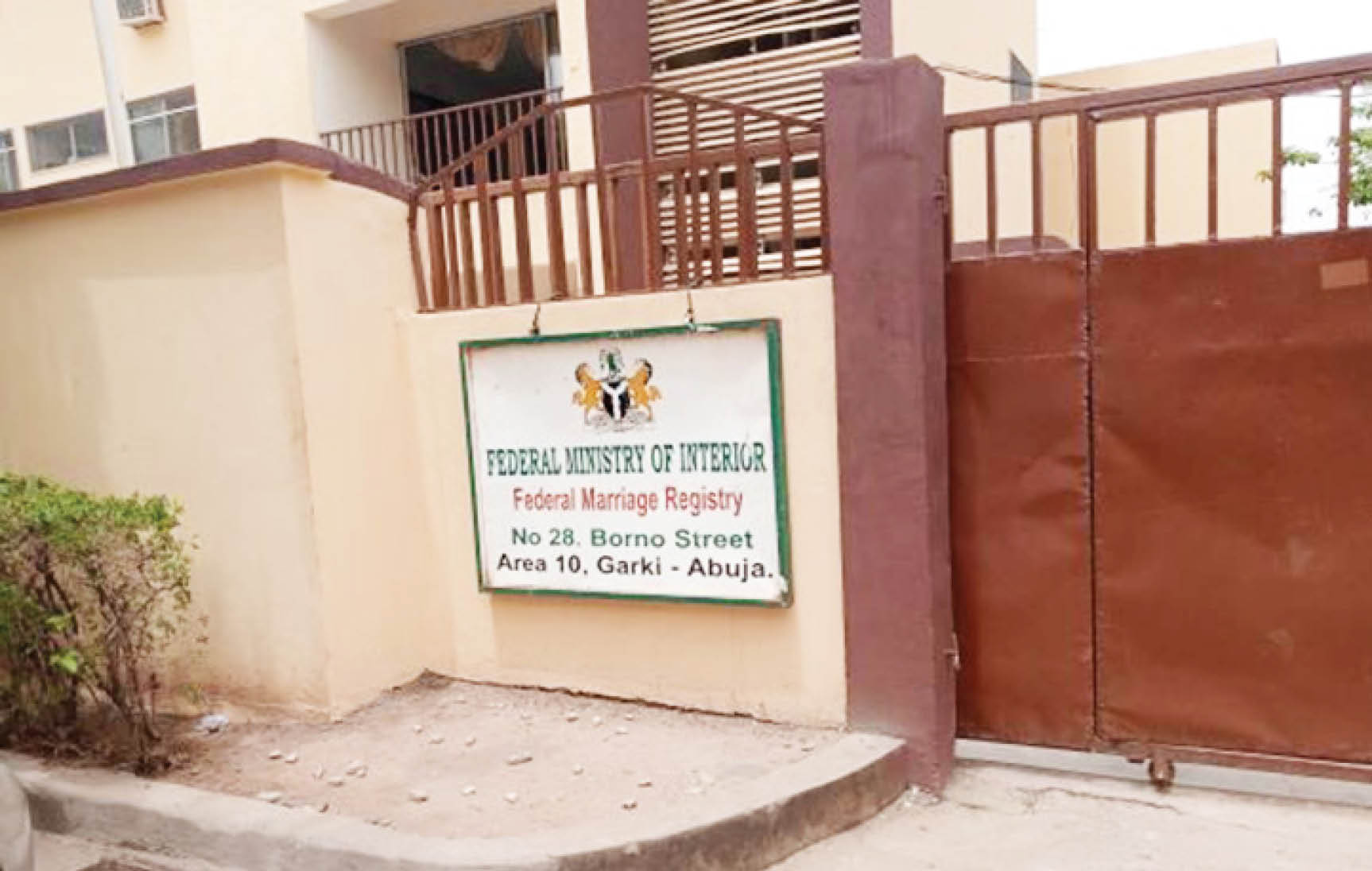In this report, Jennifer Ugwa went undercover as an intending bride in need of a statutory marriage licence to expose sharp and corrupt practices of marriage registrars and officials appointed by the Federal Ministry of Interior within the FCT.
The inconspicuous sign stringed to the low- fenced wall on the dusty road only read: Marriage Registry, Kuje Area Council, Town Hall.
A flat white iron board– was the only indication of the presence of a registry as an arrow was pointing in the opposite direction away from the Women Development Centre.
On a hot Wednesday afternoon, Abah Benjamin, office assistant to the registrar sat bent over notes scattered on an old wooden desk in the reception.
As the sound of approaching footsteps got closer, Benjamin stopped writing and attended to the visitor.

Tits for Tats
Among the scattered sheets of paper on Benjamin’s clustered table is a pamphlet advertising a ‘Now and Forever’ union in Kuje registry.
“Good afternoon. How may I help you?” Benjamin greeted.
Upon this reporter’s revelation that she was there to legalise her marriage, the assistant proceeded to give her a download of how much her quest will cost.
Benjamin explained that for N20,500( Twenty thousand five hundred nairas) ($53.2645) which can be paid in installments, the marriage can be certified within 21 workdays.
However, despite the favourable fees which were below the official sum of N21,000, as of March, the officials had found a loophole to squeeze out more cash from couples.
Since Saturdays are often a free day from work and business engagements for most people, ceremonial activities are also slated for the weekends.
Nevertheless, if a solemnisation is to take place in this registry on such days, “You have to pay an additional fee of N10,000,” Benjamin disclosed.
“We are civil servants, officially we don’t work on weekends. So you have to pay. But feel free to choose any other day,” he said.
The foreknowledge that intending couples prefer a weekend wedding is the axe registrars wield to their advantage.
And this additional payment is not going to be receipted. It is for private pockets.

Meanwhile, on the list of requirements was also a request for a carton of malt drink which the assistant said was as mandatory as the provision of an affidavit.
“You can monetise the cartoon of malt if you don’t want to carry anything,” Benjamin said.
“Don’t you know how much a carton of Malt is? You can find out,” added the assistant upon his clients’ inquiry on how much it would cost her.
Based on his explanations, it was certain the marriage won’t hold if the soft drink was not provided.
Benjamin would later suggest an urgent marriage certification for N30,000 ($77.9470) instant payment which could be awarded within 24hours or less.
This could be done in contravention of the provision of the Marriage Act that allows for 21-28 days public notification of such unions.
Yet, this new arrangement will not exclude the carton of malt and two pens.
When Benjamin was asked for the registry’s banking details to facilitate deposits he claimed there was none just as he would also claim there was no official website for the agency.
Finally, he provided his First Bank private banking details; Abbah Benjamin, Account number: 3050028920 through which the payment can be facilitated with a promise to help the ‘bride’ create a folder.
The Federal Capital Territory is made up of six Area Councils, each has a statutory licencing registry bound by the Nigerian marriage laws.
For an ordinary marriage statutory licensing which is between indigenous Nigerians, the official cost is N15,000 ($38.9735) while the official cost to obtain a special marriage certificate is N25,000 ($64.9563). A special marriage is one between a Nigerian and a foreigner.
But registries within the state capital flouts provisions of these laws.
Abuja registry where you can marry a ghost
The concept of ghost marriages associated with the unification of a living person to a dead party although practised by a few cultures in the world is not legally recognised by the Nigerian constitution.
However, for the right price, as impossible as the thought of getting hitched to a ghost may seem, it can be done in this small marriage registry in Bwari Area Council Abuja.
After the exchange of pleasantries, the registrar who introduced himself as Mohammed—later identified by an identity call App as Madaki Dahiru Mohammed— handed out a laminated sheet of marriage requirements to his new client.
“Just go through it. I am coming to attend to you and explain anything you don’t understand,” he said.
This was a few seconds before he dashed off to the adjoining office.
Mohammed was at the present more interested in purchasing new sets of footwears from the shoe vendor in the next room.

According to this new set of requirements, and N16,000 fee, excluding one carton of Maltina drink (with an option to monetising at N3,000), N1,000 for four copies of photographs by the in-house photographer and other personal documents, any marriage can be legalised within 21 working days.
“The 21 days starts from the day you registered, but anything less than this will attract an extra charge of N10,000,” Mohammed explained.
This price is, however, not inclusive of an additional N 10,000 if a couple opts for a weekend solemnisation.
Meanwhile, neglecting his former directives about the appearance of both the groom and bride on a fixed date, Mohammed would quickly suggest a ghost marriage between her ‘supposed based’ Switzerland husband.
“If he can’t come back by then, we can do a ghost marriage. It means we didn’t see the husband.
“But you will pay more. That one will cost you N50,000($ 129.916).”
“We do that. “We call it ghost marriage. It is just that it is more costly that’s all,” the registrar said.
Nonetheless, under section 44 of the Nigerian Marriage Act, the impersonation of any person in a marriage or under a false name or description, with intent to deceive other parties to the marriage, is an offence liable to five years imprisonment.
It was however unclear if the registrar was going to arrange for a fake husband to represent the absentee groom.
In order not to break any law contained in this act, the investigation was halted at this point.
Just as will be expected, payment was to be transacted on a one on one basis with no intermediary apart from the registrar.
“All you need to do is to sign where necessary and you can scan it (certificate) to him over there and he signs. He can use it to do whatever he wants over there,” Mohammed said.
Splashed across the wooden mauve-cushioned notice board in the small office was pictures of married couples.

He took great pride in showing off several interracial marriages the registry had officiated in the past months.
“This woman’s husband is not a Nigerian I think he is a contractor here in Nigeria and they just had the marriage done here not long ago.”
Despite Mohammed’s success in conducting foreign marriages, it is worthy to note that presiding over a statutory licencing of a ghost marriage is in contravention of section 42 of the Marriage Act.
“Whoever performs or witnesses as a marriage officer the ceremony of marriage, knowing that he is not duly qualified so to do.
“Or that any of the matters required by law for the ceremony, the validity of such marriage has not happened or been performed, so that the marriage is void or unlawful on any ground, shall be liable to imprisonment for five years.”
Barrister Bridget Edokwe, Editor in Chief BarristerNg, a law-focused online publication during an interview with this journalist said there is ‘no place’ for ghost marriage in the Nigerian constitution.
Edokwe said the practice of this act in whatever form is a sharp practice that contravenes the Nigerian Matrimonial Cause Act.
“Normally a marriage is done when the two parties involved are present. So, whatever they (registries) are doing separate from that is a side run and they cannot publicly declare this.
“It is illegal,” she said vehemently.
Edokwe also affirmed that it has been observed that in some instances, registrars in connivance with the couples present a family member who takes the place of an absentee husband.
The abroad fever enabling sham marriage
Although Benjamin’s opportunity to extort extra fees in Kuje was ruined by the late revelation on the residency of his client’s beau abroad, he was benevolent enough to advise against divulging such information to a senior official.
“Don’t let my madam hear that or you will pay more. Maybe if you had told me earlier I would have collected more money from you,” he warned.
The clamour for foreign-based clients or couples with spouse resident abroad has created a high inclination to be of service to these groups and/or individuals at registries.
And this stratagem assistance does not come without heavy monetary requirements from officials.
Fuelling the need for sham marriages is also the craze for obtaining residential visas abroad by deceptive individuals who conspire with illegal marriage arrangement agencies in Nigeria as a primary avenue of gaining entrance into foreign countries.
Based on data obtained from Abuja Municipal marriage registry, almost 13,000 marriages from 2015- 2019 have been awarded statutory licences in the FCT alone.
Unfortunately, of this number, it would be impossible to ascertain the exact number of marriages that have been solemnised under false identities with ghost representatives.
Except for instances where foreign emissaries visit marriage registries to confirm the legalisation of unions, thorough checks are not (or rarely) done by the Nigerian counterparts to verify individual claims of marriage.
This dismal oversight Barr. Edokwe said has become an injurious action on individual and societal morals.
“It is a personal decision that people make but someone else can have a different opinion about it but it doesn’t make it right,” she said.
Federal Marriage Registry—Maximum cashouts
Marriage registries are domiciled under the Ministry of Interior and overseen by the same agency with the Federal Marriage registry situated in the city capital, Abuja.
Contrary to the official fees for statutory licencing as published on its website, the cost of marriage solemnisation within the FCT varies across the four visited registries.
And the Federal Marriage Registry is no different.
Ladi, a tall dark-skinned lady probably in her late 5o’s is the frontline official in this registry.
Any questions, inquiries and verifications will first be presented at her desk.
Although she answers to a higher authority, all the action goes down in the small office she occupies in the one-story building that houses the registry in Area 10 Garki.
As is the protocol now, Ladi is ready with copies of printed marriage requirements cut into smaller sheets that are given to couples upon arrival to the registry.
For an ordinary marriage, and public notice of 21 days, N34,000 is the fee. Meanwhile, for less than that at seven days notification, it will cost N48,000.
With patronage of richer clientele, this particular registrar is busier than the others visited by the reporter.
Marriages are legalised three times within the week— on Tuesdays, Thursdays and Saturdays.
And payments are received by the official. The existence of a registration portal is never mentioned to couples, neither is there any information indicative of a self-help process.
Hence, Joseph Osuigwe, 35, a child rights activist was taken aback when he was informed by an official at the Abuja Municipal marriage registry that it would cost him N27,000 to legalise his marriage.
Instead of N21,000 as indicated on the official website of the Ministry of Interior, he is about to pay more despite what he knew.
“When I insisted on printing out the Remita myself and paying directly at the bank, it still didn’t change much,” the activist said.
“Because I was still asked to pay an additional fee for processing and for the scroll that the marriage certificate would be issued in!” Osuigwe narrated, obviously still upset from the dilation of his voice.
Osuigwe said his knowledge of the existence of such a portal came as a surprise to the officials who he claimed tried to stop him from divulging this information to other applicants.
“If people know the actual amount, that would mean bad business for them. But I still told anyone who would listen,” he said.
The citizen… portal, enables couples intending to legalise their union facilitate registration and payment online.
But disappointedly, all registrars encountered by this journalist displayed crass ignorance about the existence of such a platform.
Although public notification of marriages in different states of the federation is updated on the website, most certifications do not satisfy the 21- 28 days notice.
Diamond in the dirt
Gwagwalada area council marriage registry is just an hour and a few minutes drive from the city centre.
On this Wednesday morning, it seemed the prerogative was to devour hot plates of ‘Amala’ (a local cuisine made from yam flour) before business.
But this victual self-assigned objective proved to be no hindrance to service delivery.
Save for the mandatory provision of a cartoon of malt beverage and two black biros, marriage legalisation under a 21-day public notice is N15,500.
Although Mr Ibro, a registry official, was informed by the reporter that her spouse was not in the country, neither Ibro nor any of the other officials made any other extra demand.
Besides, the official warned that the legalisation process will not take place if all the parties involved were not present.
“Open your file, come with your ring or Bible on the date that’s all,” Ibro said.
New marching order, wrong soldiers
Although the ecitibiz portal on the Min. Of Interior’s website exists, only a handful of person’s like Oseigwe is aware of the portal.
The existence of such a website is not publicized rather, individual registrar advertise the statutory licencing offices that they oversee.
It is no wonder that despite a new directive by the Ministry of Interior on July 1, which reduced the statutory marriage fee to N15,000 and N25,000 for ordinary and special licencing, from the initial fees of N21,000 and N30,000 respectively, registries are still extorting couples months after.
Like in the case of Kuje registry, instead of N20,500 fee for ordinary licencing he had earlier billed this reporter, Benjamin said hiked the fee by a thousand nairas.
He refused to confirm if there has been any monetary change since the last visit.
His cryptic response was “until you come to the office.”
Kuje is not the only registry that is defaulting as of September, ghost marriages could still be facilitated in Bwari.
“For an Express certificate, it is still N30,000 but your case is under the ghost category and that is N50,000,” Mohammed reasserted over the phone.
He told The ICIR that an arrangement can be made to have the ‘supposed husband’ signature emailed and attached to the license.
Gloria Okwu, programme officer at Civil Society Legislative Advocacy Center,(CISLAC) in an interview with this reporter said that the ineffectiveness of reforms often pulsates from the absence of proper governance structures.
“Our problem is not the absence or shortage of laws and directives, it is the domestication of such laws.
“There is no implementation plan. Unfortunately, this is now common. There are zero monitoring agencies,” she said.
Okwu noted that the impunity culture in the Nigerian system of government does not make room for accurate checks and balances.
“Because people don’t know their rights, corrupt government officials can exploit them and get away with it.”
Also, she bemoaned the absence of public orientation on crucial matters affecting the citizens.
A development which Okwu said is borne out of the dismal attitude of agencies charged with such duties.
“Instead, you find that it is now the media and Non- Governmental Organisation that are doing their job for them. The excuse is always the same; lack of funding.
“The National Orientation Agency is more or less a moribund agency and is doing next to nothing,” she said.
Although a 2008 report by the Service Compact with all Nigerian, (SERVICOM) revealed incompetencies and irregularities at the Nigerian marriage registries.
Twelve years later, corruption and unprofessionalism still is the ethos that impedes the legal framework of the marriage registry system.
This story was supported by The International Center for Investigative Reporting (ICIR)

 Join Daily Trust WhatsApp Community For Quick Access To News and Happenings Around You.
Join Daily Trust WhatsApp Community For Quick Access To News and Happenings Around You.


